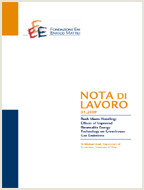Tipping Points and Loss Aversion in International Environmental Agreements

12.02.2016
Doruk İriş (School of Economics – Sogang University – Mapo-gu); Alessandro Tavoni (Grantham Research Institute on Climate Change and the Environment, London School of Economics)
D0, D03, Q5, Q50, Q58
Catastrophic Climate Change, Threshold, Loss-Aversion, International Environmental Agreements, Coalition Formation Game
Climate Change: Economic Impacts and Adaptation
Francesco Bosello
We study the impact of loss-aversion and the threat of catastrophic damages, which we jointly call threshold concerns, on international environmental agreements. We aim to understand whether a threshold for dangerous climate change is as an effective coordination device for countries to overcome the global free-riding problem and abate sufficiently to avoid disaster. We focus on loss-averse countries negotiating either under the threat of either high environmental damages (loss domain), or low damages (gain domain). Under symmetry, that is when countries display identical degrees of threshold concern, we show that such beliefs have a positive effect on reducing the emission levels of both signatories to the treaty and non-signatories, leading to higher global welfare and weakly larger coalitions of signatories. We then introduce asymmetry, by allowing countries to differ in the degree of concern about the threat of disaster. We show that stable coalitions are mostly formed by the countries with higher threshold concern. When enough countries having no threshold concern could cause the coalition size to diminish, regardless of the other countries have strong or mild threshold concerns.
***
Suggested citation: Iris, D., A. Tavoni, (2016), ‘Tipping Points and Loss Aversion in International Environmental Agreements’, Nota di Lavoro 25.2016, Milan, Italy: Fondazione Eni Enrico Mattei
